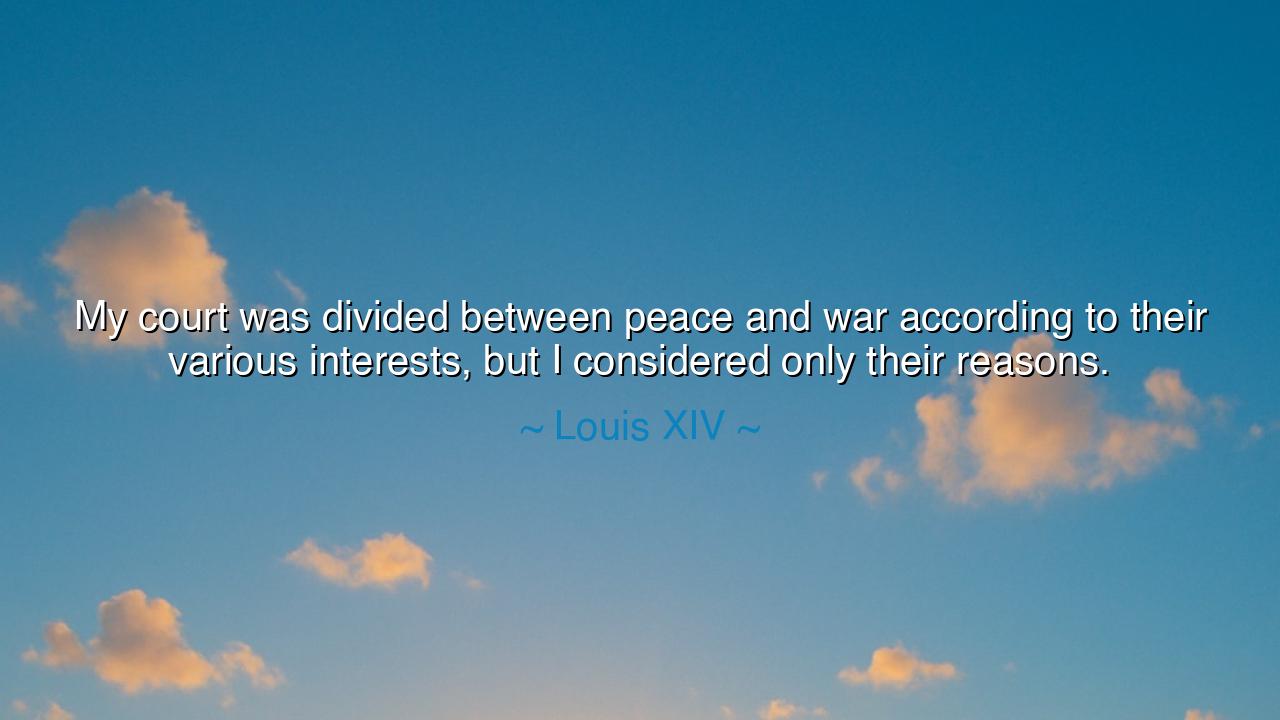
My court was divided between peace and war according to their
My court was divided between peace and war according to their various interests, but I considered only their reasons.






"My court was divided between peace and war according to their various interests, but I considered only their reasons." These words, spoken by the great Louis XIV, the Sun King of France, reveal the depth of his understanding of power, diplomacy, and leadership. A king's court is not merely a place of ceremony and entertainment; it is a battleground of ideas, ambitions, and conflicting interests. Those who gather around a ruler often come with their own desires—some seek peace, others seek war, and each plays their part in shaping the ruler's decisions. Yet, in the eyes of Louis XIV, the path to true leadership lies not in blindly following the desires of his court but in carefully weighing the reasons behind those desires, seeking a deeper understanding of the motivations that drive the voices around him.
In ancient times, Solomon, the wise king of Israel, understood the weight of ruling amidst division. His court, though not as grand as Louis XIV's, was similarly filled with competing interests, each member seeking to influence his decisions. Yet, Solomon's wisdom lay not in granting power based on the loudest voices or the most frequent demands, but in understanding the reasons behind the conflicts and aspirations of his people. He asked for discernment, for the ability to see beyond the surface and understand the hearts of those around him. In the same way, Louis XIV realized that to rule with wisdom, a ruler must look beyond the surface divisions—be they peace or war—and focus on the reasons that each side presents.
Consider the great empire of Rome. Julius Caesar, too, faced a court of divided loyalties, with senators and generals pushing for various courses of action. His leadership, which led to the expansion of the Roman Empire, was not built merely on the popularity of one decision or another. Rather, it was grounded in his ability to read the reasons behind the political factions vying for power. His bold decisions—like crossing the Rubicon—were not made lightly; they were the result of a deep understanding of the shifting dynamics within his court and the larger political landscape. Caesar understood that peace and war were tools, not ends in themselves, and that the reasoning behind each was what ultimately shaped the destiny of the empire.
Louis XIV's decision-making is also a reflection of the power of reasoned leadership. His reign, known for the magnificence of Versailles and his consolidation of power, was not without its challenges. At various points, the French court was sharply divided, especially in matters of war. The wars of expansion that Louis XIV waged were not simply the result of desire for conquest or glory; they were driven by complex reasoning involving security, diplomacy, and economic strategy. His ability to discern the true reasons behind the conflicts at court allowed him to navigate these pressures and steer France toward his vision of glory. By carefully considering the motives and the logic behind his advisors' counsel, he maintained control and crafted a legacy that shaped France for generations.
Yet, Louis XIV’s wisdom did not always guarantee the success of his decisions. The war he waged and the peace he sought came at great cost. The lavish lifestyle at Versailles, a symbol of the king’s absolute power, also became a source of resentment among the nobility and the people. His actions, while often guided by reason, sometimes failed to account for the broader societal impacts of his decisions. Wars that seemed justified at the time, driven by the need for national security, often led to economic strain and civil unrest. This duality of peace and war—as shaped by the interests of those at court—reminds us that even the most careful ruler must remain vigilant to the long-term consequences of their choices.
The lesson of Louis XIV is one that we can all apply in our own lives. Just as a ruler must weigh the interests of their court, so too must we consider the reasons behind the decisions we make in our personal and professional lives. Life often presents us with conflict—whether it be in the form of difficult choices or opposing views. In such moments, it is easy to follow the loudest voice, the most immediate impulse, or the most visible benefit. But true wisdom lies in taking the time to reflect on the reasons that drive each decision, understanding the deeper motivations and potential consequences of our actions. In doing so, we find clarity and balance in navigating our paths.
In practical terms, the ability to weigh reasons and not just desires requires patience, reflection, and an openness to differing perspectives. Just as Louis XIV understood that the court’s divisions could not dictate his decisions, so too must we remember that our internal conflicts and external pressures are part of the broader tapestry of our lives. By listening to all voices and considering the deeper reasons behind each call to action, we can lead ourselves—and those around us—toward more thoughtful, balanced decisions that contribute to long-term peace and fulfillment.






AAdministratorAdministrator
Welcome, honored guests. Please leave a comment, we will respond soon